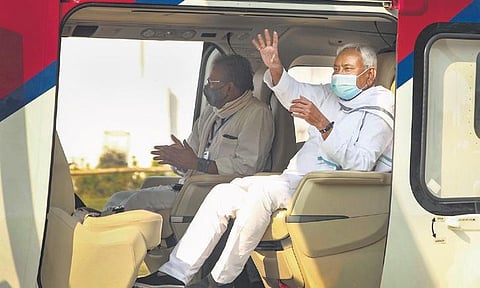

Once called 'India's Wild East', Bihar is set for another assembly elections and is getting more attention than ever this time.
There are two reasons why Bihar Polls 2020 are turning out to be so important.
For starters, it is the first mass elections in the shadow of the coronavirus pandemic in India. Secondly, after many years, prominent leaders of the state, namely Lalu Prasad Yadav and the late Ram Vilas Paswan, will be missing from the action.
Elections in India are a grand affair. Billboards, posters, mass rallies and crowds are a must for parties to make their presence felt. The sloganeering, and the 'oohs' and the 'aahs' from the crowd when a leader walks in to address a rally, are a sight to see. Thousands of people wait in lines or sit closely, to listen to their leaders make promises once again in return for their vote.
However, this time due to the ongoing COVID-19 pandemic, the Election Commission of India (ECI) released a set of guidelines to be followed by each party and their workers during campaigning. For the first time, parties were told to organise large-scale 'virtual rallies' in the villages and cities of Bihar.
Many leaders (Bihar CM Nitish Kumar was a notable exception) called for the polls to be deferred. But the Election Commission of India went ahead promising a 'safe and secure' elections for both leaders and voters.
Some of the new rules for campaigning included:
1. A group of five people, including candidates, but excluding security personnel, is allowed to campaign from door to door.
2. For roadshows, the convoy of vehicles should be broken after every five vehicles instead of 10.
3. The interval between two sets of convoys should be half an hour instead of a gap of 100 metres.
Reports and pictures of the campaigning proved that many of these guidelines remained only on paper.
Parties were seen flouting elections SOPs. Hundreds of people attended rallies of top leaders including Chief Minister Nitish Kumar and the grand alliance's chief ministerial candidate Tejashwi Yadav without wearing face masks. Videos on social media platforms showed people pushing and shoving each other during these rallies.
Opposition parties, the Congress, RJD, CPI(M) and BSP, have raised concerns about voter turnout amid the pandemic. To make things worse, top leaders of Bihar, including Deputy Chief Minister Sushil Kumar Modi, BJP in-charge for Bihar polls Devendra Fadnavis, BJP national spokesman Syed Shahnawaz Hussain and former state minister Narendra Singh tested positive for COVID-19.
This raises a question - is India ready for a 'free, fair and safe' election, especially since person-to-person contact while campaigning, voting and counting is unavoidable.
What are the guidelines issued by ECI for voters?
The first phase of campaigning came to an end on October 26 and not everyone followed the COVID-19 norms.
A report in The New Indian Express showed that parties did try holding 'virtual rallies'. In the 2015 Assembly polls, 32 helicopters were booked by political parties, including 16 by the BJP. This time around, only 11 have been hired — six by the BJP and the rest by the JD(U) and others.
So how is Bihar securing voter's health while ensuring their right to vote?
As per the data provided by the Election Commission of India, Bihar has 7.29 crore eligible voters this time around. In the 2015 elections, the state had 65,367 polling stations. The number now stands at 1,06,526, an increase of 62.96 per cent. 1,066 candidates are in the fray for the first phase of elections, 114 of them females.
The experiences of many countries, including New Zealand, South Korea, Sri Lanka has given the confidence that elections can be held during a pandemic if all protocols in place. But we will know if they can be in India too only once the Bihar polls are over.